Charles Sturt University: Ethical Theories & Student Data Use
VerifiedAdded on 2023/06/05
|5
|2225
|311
Essay
AI Summary
This essay critically examines the ethical implications of universities collecting and using student data for various purposes, such as improving student retention and creating social interaction models. It analyzes the situation through the lens of four prominent ethical theories: Utilitarianism, Deontology, Virtue Ethics, and Contract Theory. The essay highlights the ethical dilemmas arising from the lack of student consent and the potential for data misuse, arguing that current practices may be unethical. Each ethical theory is applied to the scenario, revealing different perspectives on the morality of data collection. The author concludes that while data collection can be beneficial, it must be conducted with student consent, data anonymization, and the option for students to opt out, in order to align with established ethical principles. Desklib provides access to this essay and many other solved assignments for students.
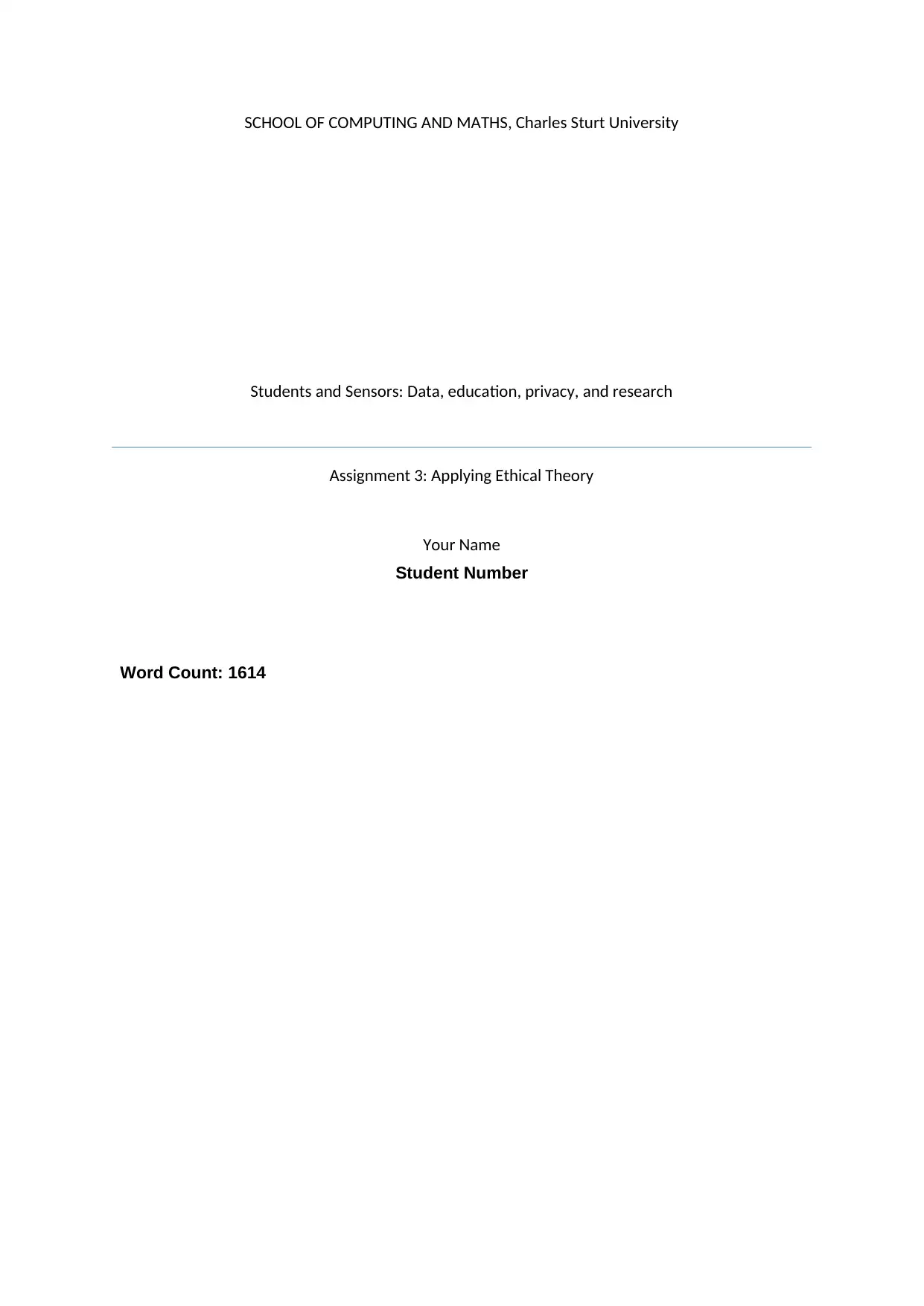
SCHOOL OF COMPUTING AND MATHS, Charles Sturt University
Students and Sensors: Data, education, privacy, and research
Assignment 3: Applying Ethical Theory
Your Name
Student Number
Word Count: 1614
Students and Sensors: Data, education, privacy, and research
Assignment 3: Applying Ethical Theory
Your Name
Student Number
Word Count: 1614
Paraphrase This Document
Need a fresh take? Get an instant paraphrase of this document with our AI Paraphraser
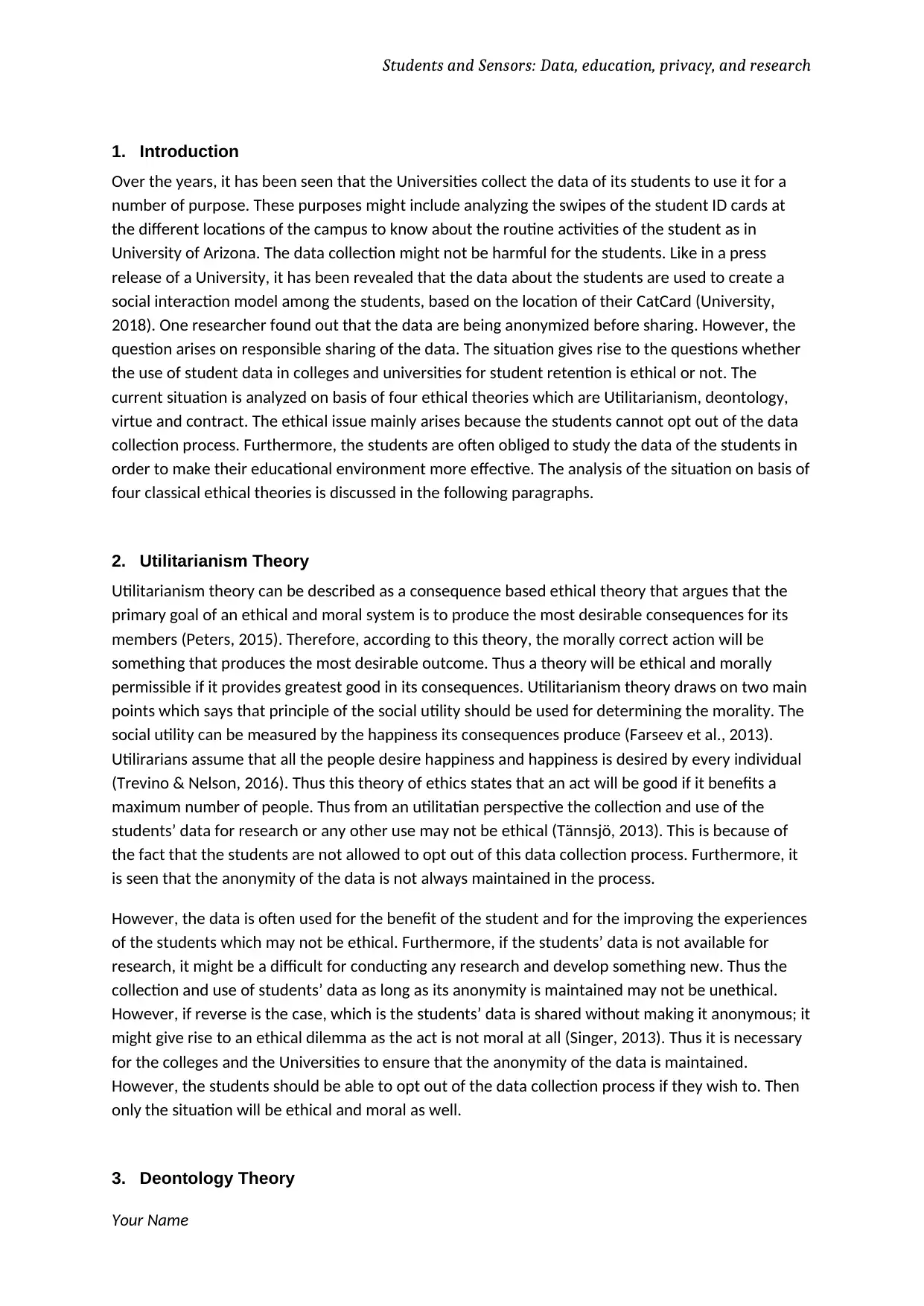
Students and Sensors: Data, education, privacy, and research
1. Introduction
Over the years, it has been seen that the Universities collect the data of its students to use it for a
number of purpose. These purposes might include analyzing the swipes of the student ID cards at
the different locations of the campus to know about the routine activities of the student as in
University of Arizona. The data collection might not be harmful for the students. Like in a press
release of a University, it has been revealed that the data about the students are used to create a
social interaction model among the students, based on the location of their CatCard (University,
2018). One researcher found out that the data are being anonymized before sharing. However, the
question arises on responsible sharing of the data. The situation gives rise to the questions whether
the use of student data in colleges and universities for student retention is ethical or not. The
current situation is analyzed on basis of four ethical theories which are Utilitarianism, deontology,
virtue and contract. The ethical issue mainly arises because the students cannot opt out of the data
collection process. Furthermore, the students are often obliged to study the data of the students in
order to make their educational environment more effective. The analysis of the situation on basis of
four classical ethical theories is discussed in the following paragraphs.
2. Utilitarianism Theory
Utilitarianism theory can be described as a consequence based ethical theory that argues that the
primary goal of an ethical and moral system is to produce the most desirable consequences for its
members (Peters, 2015). Therefore, according to this theory, the morally correct action will be
something that produces the most desirable outcome. Thus a theory will be ethical and morally
permissible if it provides greatest good in its consequences. Utilitarianism theory draws on two main
points which says that principle of the social utility should be used for determining the morality. The
social utility can be measured by the happiness its consequences produce (Farseev et al., 2013).
Utilirarians assume that all the people desire happiness and happiness is desired by every individual
(Trevino & Nelson, 2016). Thus this theory of ethics states that an act will be good if it benefits a
maximum number of people. Thus from an utilitatian perspective the collection and use of the
students’ data for research or any other use may not be ethical (Tännsjö, 2013). This is because of
the fact that the students are not allowed to opt out of this data collection process. Furthermore, it
is seen that the anonymity of the data is not always maintained in the process.
However, the data is often used for the benefit of the student and for the improving the experiences
of the students which may not be ethical. Furthermore, if the students’ data is not available for
research, it might be a difficult for conducting any research and develop something new. Thus the
collection and use of students’ data as long as its anonymity is maintained may not be unethical.
However, if reverse is the case, which is the students’ data is shared without making it anonymous; it
might give rise to an ethical dilemma as the act is not moral at all (Singer, 2013). Thus it is necessary
for the colleges and the Universities to ensure that the anonymity of the data is maintained.
However, the students should be able to opt out of the data collection process if they wish to. Then
only the situation will be ethical and moral as well.
3. Deontology Theory
Your Name
1. Introduction
Over the years, it has been seen that the Universities collect the data of its students to use it for a
number of purpose. These purposes might include analyzing the swipes of the student ID cards at
the different locations of the campus to know about the routine activities of the student as in
University of Arizona. The data collection might not be harmful for the students. Like in a press
release of a University, it has been revealed that the data about the students are used to create a
social interaction model among the students, based on the location of their CatCard (University,
2018). One researcher found out that the data are being anonymized before sharing. However, the
question arises on responsible sharing of the data. The situation gives rise to the questions whether
the use of student data in colleges and universities for student retention is ethical or not. The
current situation is analyzed on basis of four ethical theories which are Utilitarianism, deontology,
virtue and contract. The ethical issue mainly arises because the students cannot opt out of the data
collection process. Furthermore, the students are often obliged to study the data of the students in
order to make their educational environment more effective. The analysis of the situation on basis of
four classical ethical theories is discussed in the following paragraphs.
2. Utilitarianism Theory
Utilitarianism theory can be described as a consequence based ethical theory that argues that the
primary goal of an ethical and moral system is to produce the most desirable consequences for its
members (Peters, 2015). Therefore, according to this theory, the morally correct action will be
something that produces the most desirable outcome. Thus a theory will be ethical and morally
permissible if it provides greatest good in its consequences. Utilitarianism theory draws on two main
points which says that principle of the social utility should be used for determining the morality. The
social utility can be measured by the happiness its consequences produce (Farseev et al., 2013).
Utilirarians assume that all the people desire happiness and happiness is desired by every individual
(Trevino & Nelson, 2016). Thus this theory of ethics states that an act will be good if it benefits a
maximum number of people. Thus from an utilitatian perspective the collection and use of the
students’ data for research or any other use may not be ethical (Tännsjö, 2013). This is because of
the fact that the students are not allowed to opt out of this data collection process. Furthermore, it
is seen that the anonymity of the data is not always maintained in the process.
However, the data is often used for the benefit of the student and for the improving the experiences
of the students which may not be ethical. Furthermore, if the students’ data is not available for
research, it might be a difficult for conducting any research and develop something new. Thus the
collection and use of students’ data as long as its anonymity is maintained may not be unethical.
However, if reverse is the case, which is the students’ data is shared without making it anonymous; it
might give rise to an ethical dilemma as the act is not moral at all (Singer, 2013). Thus it is necessary
for the colleges and the Universities to ensure that the anonymity of the data is maintained.
However, the students should be able to opt out of the data collection process if they wish to. Then
only the situation will be ethical and moral as well.
3. Deontology Theory
Your Name
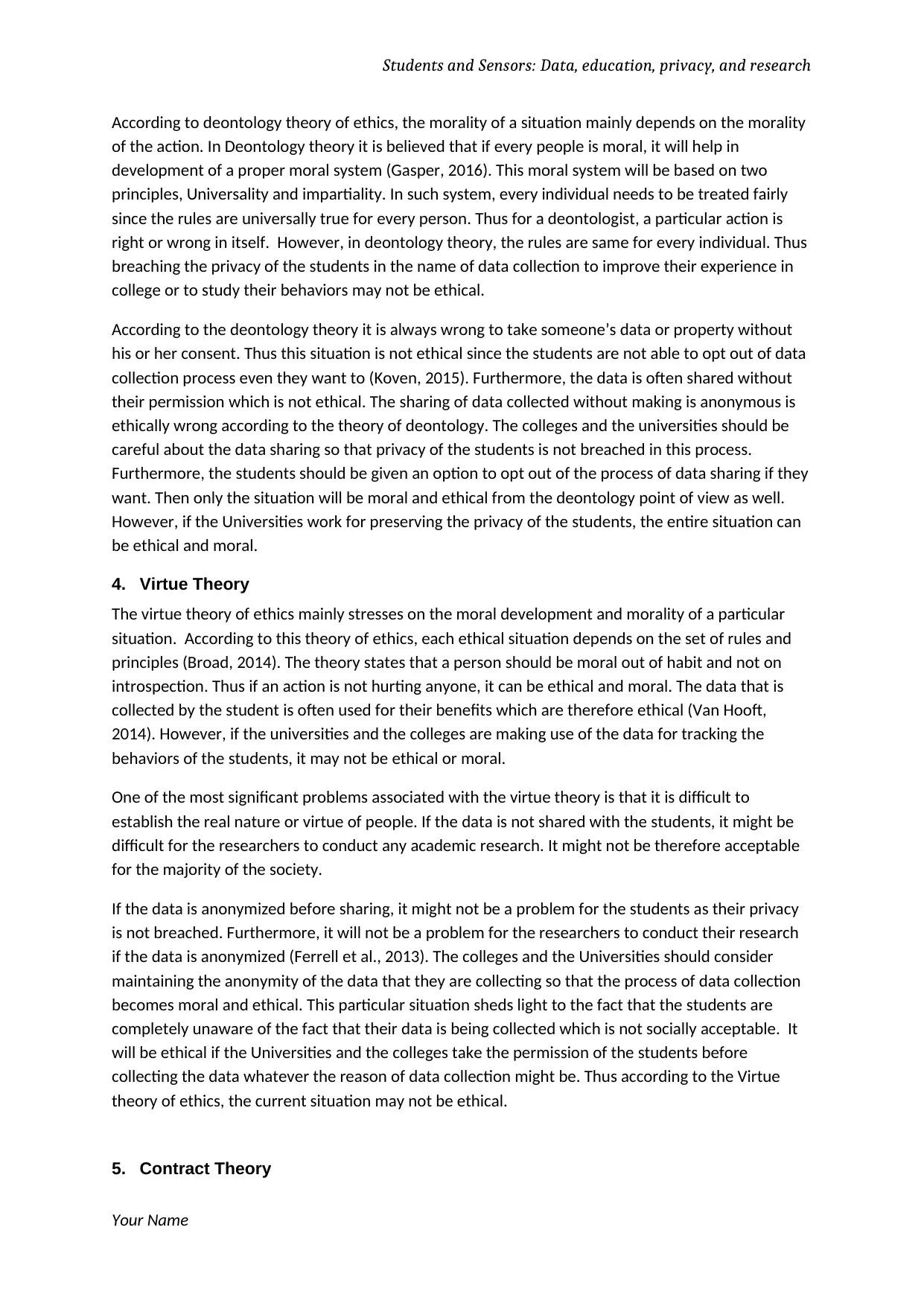
Students and Sensors: Data, education, privacy, and research
According to deontology theory of ethics, the morality of a situation mainly depends on the morality
of the action. In Deontology theory it is believed that if every people is moral, it will help in
development of a proper moral system (Gasper, 2016). This moral system will be based on two
principles, Universality and impartiality. In such system, every individual needs to be treated fairly
since the rules are universally true for every person. Thus for a deontologist, a particular action is
right or wrong in itself. However, in deontology theory, the rules are same for every individual. Thus
breaching the privacy of the students in the name of data collection to improve their experience in
college or to study their behaviors may not be ethical.
According to the deontology theory it is always wrong to take someone’s data or property without
his or her consent. Thus this situation is not ethical since the students are not able to opt out of data
collection process even they want to (Koven, 2015). Furthermore, the data is often shared without
their permission which is not ethical. The sharing of data collected without making is anonymous is
ethically wrong according to the theory of deontology. The colleges and the universities should be
careful about the data sharing so that privacy of the students is not breached in this process.
Furthermore, the students should be given an option to opt out of the process of data sharing if they
want. Then only the situation will be moral and ethical from the deontology point of view as well.
However, if the Universities work for preserving the privacy of the students, the entire situation can
be ethical and moral.
4. Virtue Theory
The virtue theory of ethics mainly stresses on the moral development and morality of a particular
situation. According to this theory of ethics, each ethical situation depends on the set of rules and
principles (Broad, 2014). The theory states that a person should be moral out of habit and not on
introspection. Thus if an action is not hurting anyone, it can be ethical and moral. The data that is
collected by the student is often used for their benefits which are therefore ethical (Van Hooft,
2014). However, if the universities and the colleges are making use of the data for tracking the
behaviors of the students, it may not be ethical or moral.
One of the most significant problems associated with the virtue theory is that it is difficult to
establish the real nature or virtue of people. If the data is not shared with the students, it might be
difficult for the researchers to conduct any academic research. It might not be therefore acceptable
for the majority of the society.
If the data is anonymized before sharing, it might not be a problem for the students as their privacy
is not breached. Furthermore, it will not be a problem for the researchers to conduct their research
if the data is anonymized (Ferrell et al., 2013). The colleges and the Universities should consider
maintaining the anonymity of the data that they are collecting so that the process of data collection
becomes moral and ethical. This particular situation sheds light to the fact that the students are
completely unaware of the fact that their data is being collected which is not socially acceptable. It
will be ethical if the Universities and the colleges take the permission of the students before
collecting the data whatever the reason of data collection might be. Thus according to the Virtue
theory of ethics, the current situation may not be ethical.
5. Contract Theory
Your Name
According to deontology theory of ethics, the morality of a situation mainly depends on the morality
of the action. In Deontology theory it is believed that if every people is moral, it will help in
development of a proper moral system (Gasper, 2016). This moral system will be based on two
principles, Universality and impartiality. In such system, every individual needs to be treated fairly
since the rules are universally true for every person. Thus for a deontologist, a particular action is
right or wrong in itself. However, in deontology theory, the rules are same for every individual. Thus
breaching the privacy of the students in the name of data collection to improve their experience in
college or to study their behaviors may not be ethical.
According to the deontology theory it is always wrong to take someone’s data or property without
his or her consent. Thus this situation is not ethical since the students are not able to opt out of data
collection process even they want to (Koven, 2015). Furthermore, the data is often shared without
their permission which is not ethical. The sharing of data collected without making is anonymous is
ethically wrong according to the theory of deontology. The colleges and the universities should be
careful about the data sharing so that privacy of the students is not breached in this process.
Furthermore, the students should be given an option to opt out of the process of data sharing if they
want. Then only the situation will be moral and ethical from the deontology point of view as well.
However, if the Universities work for preserving the privacy of the students, the entire situation can
be ethical and moral.
4. Virtue Theory
The virtue theory of ethics mainly stresses on the moral development and morality of a particular
situation. According to this theory of ethics, each ethical situation depends on the set of rules and
principles (Broad, 2014). The theory states that a person should be moral out of habit and not on
introspection. Thus if an action is not hurting anyone, it can be ethical and moral. The data that is
collected by the student is often used for their benefits which are therefore ethical (Van Hooft,
2014). However, if the universities and the colleges are making use of the data for tracking the
behaviors of the students, it may not be ethical or moral.
One of the most significant problems associated with the virtue theory is that it is difficult to
establish the real nature or virtue of people. If the data is not shared with the students, it might be
difficult for the researchers to conduct any academic research. It might not be therefore acceptable
for the majority of the society.
If the data is anonymized before sharing, it might not be a problem for the students as their privacy
is not breached. Furthermore, it will not be a problem for the researchers to conduct their research
if the data is anonymized (Ferrell et al., 2013). The colleges and the Universities should consider
maintaining the anonymity of the data that they are collecting so that the process of data collection
becomes moral and ethical. This particular situation sheds light to the fact that the students are
completely unaware of the fact that their data is being collected which is not socially acceptable. It
will be ethical if the Universities and the colleges take the permission of the students before
collecting the data whatever the reason of data collection might be. Thus according to the Virtue
theory of ethics, the current situation may not be ethical.
5. Contract Theory
Your Name
⊘ This is a preview!⊘
Do you want full access?
Subscribe today to unlock all pages.

Trusted by 1+ million students worldwide
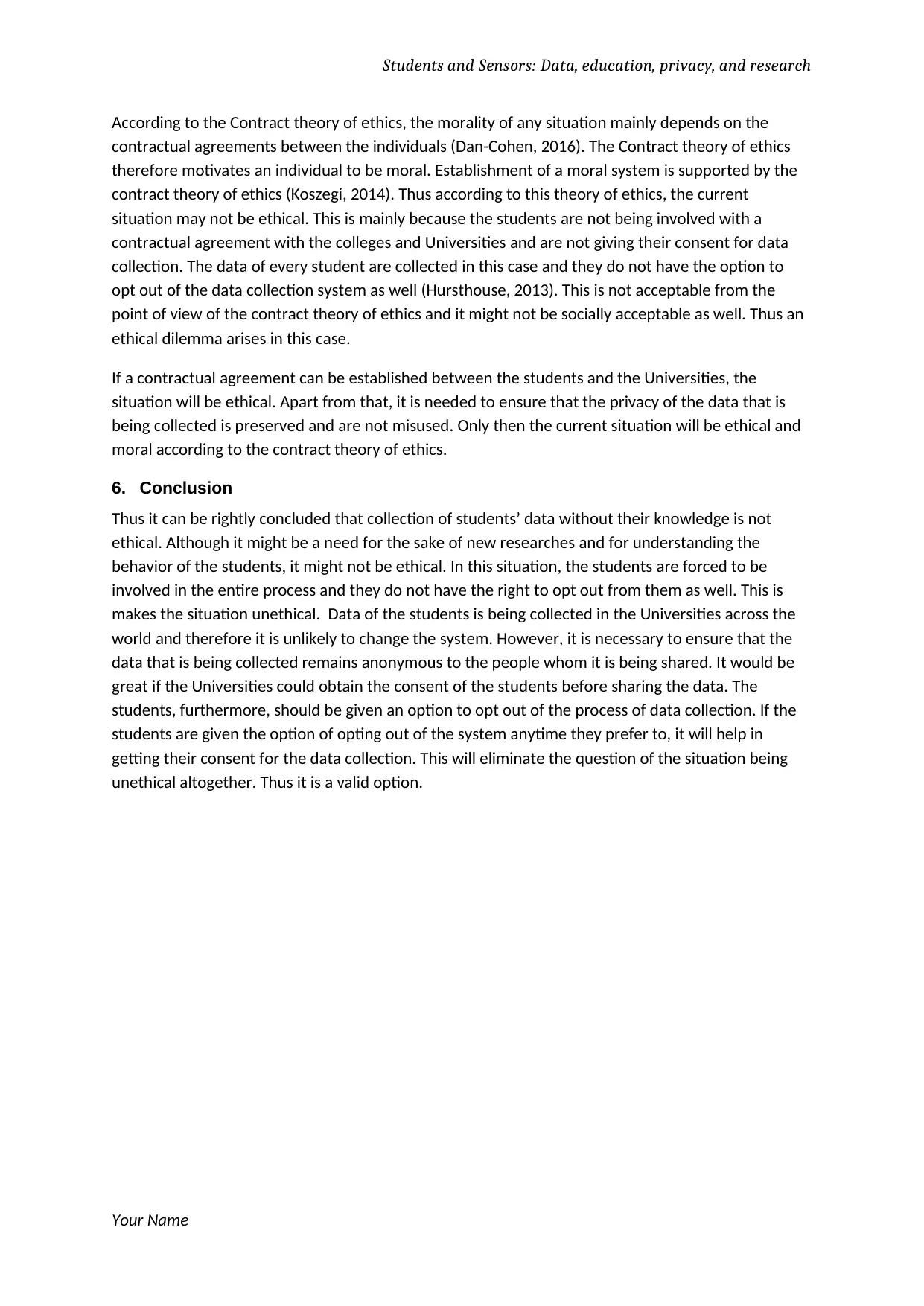
Students and Sensors: Data, education, privacy, and research
According to the Contract theory of ethics, the morality of any situation mainly depends on the
contractual agreements between the individuals (Dan-Cohen, 2016). The Contract theory of ethics
therefore motivates an individual to be moral. Establishment of a moral system is supported by the
contract theory of ethics (Koszegi, 2014). Thus according to this theory of ethics, the current
situation may not be ethical. This is mainly because the students are not being involved with a
contractual agreement with the colleges and Universities and are not giving their consent for data
collection. The data of every student are collected in this case and they do not have the option to
opt out of the data collection system as well (Hursthouse, 2013). This is not acceptable from the
point of view of the contract theory of ethics and it might not be socially acceptable as well. Thus an
ethical dilemma arises in this case.
If a contractual agreement can be established between the students and the Universities, the
situation will be ethical. Apart from that, it is needed to ensure that the privacy of the data that is
being collected is preserved and are not misused. Only then the current situation will be ethical and
moral according to the contract theory of ethics.
6. Conclusion
Thus it can be rightly concluded that collection of students’ data without their knowledge is not
ethical. Although it might be a need for the sake of new researches and for understanding the
behavior of the students, it might not be ethical. In this situation, the students are forced to be
involved in the entire process and they do not have the right to opt out from them as well. This is
makes the situation unethical. Data of the students is being collected in the Universities across the
world and therefore it is unlikely to change the system. However, it is necessary to ensure that the
data that is being collected remains anonymous to the people whom it is being shared. It would be
great if the Universities could obtain the consent of the students before sharing the data. The
students, furthermore, should be given an option to opt out of the process of data collection. If the
students are given the option of opting out of the system anytime they prefer to, it will help in
getting their consent for the data collection. This will eliminate the question of the situation being
unethical altogether. Thus it is a valid option.
Your Name
According to the Contract theory of ethics, the morality of any situation mainly depends on the
contractual agreements between the individuals (Dan-Cohen, 2016). The Contract theory of ethics
therefore motivates an individual to be moral. Establishment of a moral system is supported by the
contract theory of ethics (Koszegi, 2014). Thus according to this theory of ethics, the current
situation may not be ethical. This is mainly because the students are not being involved with a
contractual agreement with the colleges and Universities and are not giving their consent for data
collection. The data of every student are collected in this case and they do not have the option to
opt out of the data collection system as well (Hursthouse, 2013). This is not acceptable from the
point of view of the contract theory of ethics and it might not be socially acceptable as well. Thus an
ethical dilemma arises in this case.
If a contractual agreement can be established between the students and the Universities, the
situation will be ethical. Apart from that, it is needed to ensure that the privacy of the data that is
being collected is preserved and are not misused. Only then the current situation will be ethical and
moral according to the contract theory of ethics.
6. Conclusion
Thus it can be rightly concluded that collection of students’ data without their knowledge is not
ethical. Although it might be a need for the sake of new researches and for understanding the
behavior of the students, it might not be ethical. In this situation, the students are forced to be
involved in the entire process and they do not have the right to opt out from them as well. This is
makes the situation unethical. Data of the students is being collected in the Universities across the
world and therefore it is unlikely to change the system. However, it is necessary to ensure that the
data that is being collected remains anonymous to the people whom it is being shared. It would be
great if the Universities could obtain the consent of the students before sharing the data. The
students, furthermore, should be given an option to opt out of the process of data collection. If the
students are given the option of opting out of the system anytime they prefer to, it will help in
getting their consent for the data collection. This will eliminate the question of the situation being
unethical altogether. Thus it is a valid option.
Your Name
Paraphrase This Document
Need a fresh take? Get an instant paraphrase of this document with our AI Paraphraser
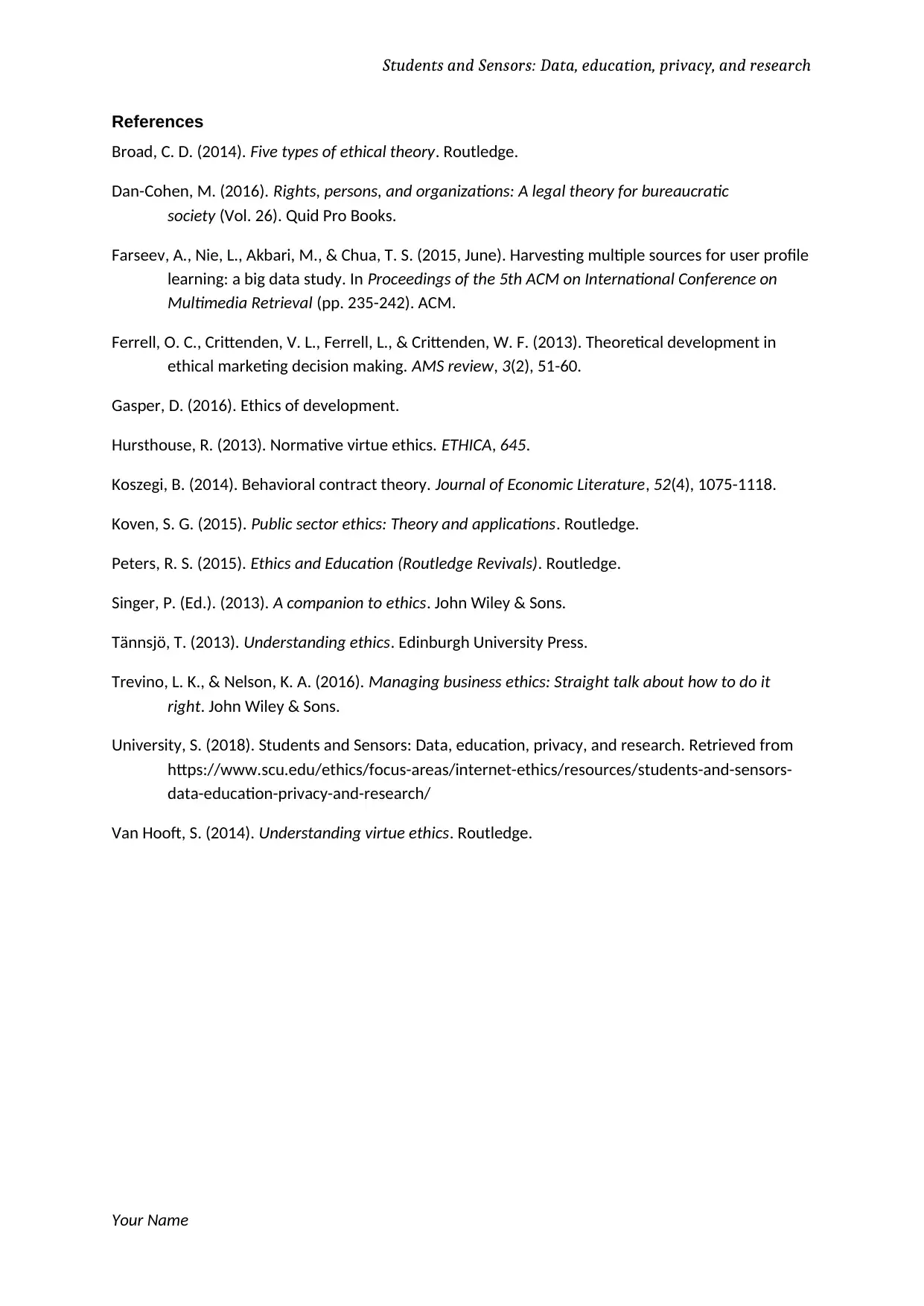
Students and Sensors: Data, education, privacy, and research
References
Broad, C. D. (2014). Five types of ethical theory. Routledge.
Dan-Cohen, M. (2016). Rights, persons, and organizations: A legal theory for bureaucratic
society (Vol. 26). Quid Pro Books.
Farseev, A., Nie, L., Akbari, M., & Chua, T. S. (2015, June). Harvesting multiple sources for user profile
learning: a big data study. In Proceedings of the 5th ACM on International Conference on
Multimedia Retrieval (pp. 235-242). ACM.
Ferrell, O. C., Crittenden, V. L., Ferrell, L., & Crittenden, W. F. (2013). Theoretical development in
ethical marketing decision making. AMS review, 3(2), 51-60.
Gasper, D. (2016). Ethics of development.
Hursthouse, R. (2013). Normative virtue ethics. ETHICA, 645.
Koszegi, B. (2014). Behavioral contract theory. Journal of Economic Literature, 52(4), 1075-1118.
Koven, S. G. (2015). Public sector ethics: Theory and applications. Routledge.
Peters, R. S. (2015). Ethics and Education (Routledge Revivals). Routledge.
Singer, P. (Ed.). (2013). A companion to ethics. John Wiley & Sons.
Tännsjö, T. (2013). Understanding ethics. Edinburgh University Press.
Trevino, L. K., & Nelson, K. A. (2016). Managing business ethics: Straight talk about how to do it
right. John Wiley & Sons.
University, S. (2018). Students and Sensors: Data, education, privacy, and research. Retrieved from
https://www.scu.edu/ethics/focus-areas/internet-ethics/resources/students-and-sensors-
data-education-privacy-and-research/
Van Hooft, S. (2014). Understanding virtue ethics. Routledge.
Your Name
References
Broad, C. D. (2014). Five types of ethical theory. Routledge.
Dan-Cohen, M. (2016). Rights, persons, and organizations: A legal theory for bureaucratic
society (Vol. 26). Quid Pro Books.
Farseev, A., Nie, L., Akbari, M., & Chua, T. S. (2015, June). Harvesting multiple sources for user profile
learning: a big data study. In Proceedings of the 5th ACM on International Conference on
Multimedia Retrieval (pp. 235-242). ACM.
Ferrell, O. C., Crittenden, V. L., Ferrell, L., & Crittenden, W. F. (2013). Theoretical development in
ethical marketing decision making. AMS review, 3(2), 51-60.
Gasper, D. (2016). Ethics of development.
Hursthouse, R. (2013). Normative virtue ethics. ETHICA, 645.
Koszegi, B. (2014). Behavioral contract theory. Journal of Economic Literature, 52(4), 1075-1118.
Koven, S. G. (2015). Public sector ethics: Theory and applications. Routledge.
Peters, R. S. (2015). Ethics and Education (Routledge Revivals). Routledge.
Singer, P. (Ed.). (2013). A companion to ethics. John Wiley & Sons.
Tännsjö, T. (2013). Understanding ethics. Edinburgh University Press.
Trevino, L. K., & Nelson, K. A. (2016). Managing business ethics: Straight talk about how to do it
right. John Wiley & Sons.
University, S. (2018). Students and Sensors: Data, education, privacy, and research. Retrieved from
https://www.scu.edu/ethics/focus-areas/internet-ethics/resources/students-and-sensors-
data-education-privacy-and-research/
Van Hooft, S. (2014). Understanding virtue ethics. Routledge.
Your Name
1 out of 5
Related Documents
Your All-in-One AI-Powered Toolkit for Academic Success.
+13062052269
info@desklib.com
Available 24*7 on WhatsApp / Email
![[object Object]](/_next/static/media/star-bottom.7253800d.svg)
Unlock your academic potential
Copyright © 2020–2026 A2Z Services. All Rights Reserved. Developed and managed by ZUCOL.


